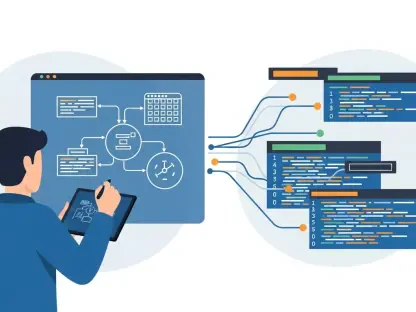Imagine a codebase so intuitive that debugging takes mere minutes, collaboration feels seamless, and maintenance becomes a breeze, yet for many developers, the reality is often tangled logic, cryptic errors, and endless hours of frustration. What separates exceptional coders from the rest? A growing consensus points to the power of small, consistent habits. This roundup dives into insights and tips from various industry perspectives to explore seven game-changing habits that can elevate coding skills. By gathering diverse opinions from seasoned developers, tech blogs, and community forums, the aim is to provide a comprehensive guide for programmers seeking to refine their craft with practical, actionable strategies.
Why Habits Are the Backbone of Great Code
The foundation of superior coding lies in disciplined routines, a view echoed across programming communities. Many seasoned developers argue that habits act as the scaffolding for tackling complex projects, much like structured training shapes athletes. Small, repeated actions can prevent common pitfalls such as unreadable scripts or persistent bugs, ensuring long-term project stability.
A recurring theme in tech discussions is the impact of consistency on overcoming procrastination and burnout. Forums highlight how daily micro-improvements build resilience, allowing coders to handle high-pressure deadlines without sacrificing quality. This perspective sets the stage for exploring specific habits that promise to transform raw talent into polished expertise.
Differing opinions exist on the pace of habit adoption, with some advocating for gradual integration while others push for an all-in approach. Despite these variances, there is agreement that intentional practice is non-negotiable for anyone aiming to stand out in the competitive tech landscape.
Diving into the Seven Habits: Collective Wisdom from the Field
Habit 1: Harnessing Clarity with Enumerations
A widely endorsed habit among coding experts is the use of enumerations over raw constants to boost code clarity. Many developers note that defining categories like user levels (Gold, Silver, Bronze) through enums makes scripts self-explanatory and less prone to errors, a point often raised in technical blogs. This practice is seen as a cornerstone for reducing misinterpretation during team collaborations.
Some industry voices emphasize the time-saving aspect, pointing out that clearer structures cut down debugging efforts significantly. Community feedback often cites examples where enumerations have prevented costly mistakes in live systems, reinforcing their value in high-stakes environments.
However, a minority expresses concern over potential over-engineering, arguing that enums can complicate simple projects. Despite this, the majority counters that the upfront effort pales in comparison to the long-term benefits of maintainable and reliable code, a stance that dominates current discussions.
Habit 2: Enhancing Readability via Explaining Variables
Descriptive variable naming, particularly for function parameters, garners strong support as a readability enhancer. Tech educators frequently stress that names like userId in payment systems clarify intent, making code accessible to future maintainers, as shared in numerous online tutorials. This habit is often praised for smoothing out team dynamics in large-scale projects.
Differing views emerge on the extent of naming detail, with some developers warning against overly verbose labels that clutter codebases. Yet, a balanced approach—favoring transparency without excess—is often recommended in coding forums, striking a middle ground that prioritizes comprehension over brevity.
Another angle from community discussions highlights how this practice aids in onboarding new team members. Clear naming conventions act as unspoken documentation, reducing the learning curve and fostering quicker contributions, a benefit repeatedly mentioned in developer anecdotes.
Habit 3: Fortifying Debugging with Robust Error Messages
Crafting detailed, context-rich error messages is a habit championed by many in the debugging sphere. Industry blogs frequently underscore how verbose errors—specifying exact failure points—slash resolution times, a sentiment echoed by developers who’ve navigated critical deployments. This approach is often hailed as a lifesaver in urgent scenarios.
While some argue for minimalist error reporting to avoid overwhelming logs, the prevailing opinion favors over-communication. Tech discussions reveal that detailed messages provide actionable insights, outweighing the minor drawback of log verbosity, especially with modern filtering tools at hand.
A unique perspective from online panels suggests pairing this habit with evolving debugging platforms. Such integration amplifies effectiveness, ensuring coders stay ahead of complex issues, a tip gaining traction among those working on intricate systems.
Habit 4: Ensuring Stability Through Resource Cleanup
Proactive resource management, such as closing files or connections immediately after use, is a discipline widely advocated in coding circles. Many developers reference try-finally blocks as essential for preventing leaks, drawing parallels to finance sector case studies where lapses caused system crashes. This habit is viewed as a marker of reliability.
Contrasting opinions surface on automation’s role, with some believing future tools will handle cleanup tasks. However, a significant portion of the community insists that personal accountability remains crucial, a point often debated in tech meetups where manual oversight is still valued.
Insights from seasoned programmers also point to the psychological benefit of this practice. Establishing a routine of immediate cleanup builds trust in one’s own code, a subtle but powerful effect noted in various developer reflections shared online.
Habit 5: Gaining Insights with Comprehensive Logging
Over-logging as a diagnostic tool finds strong backing among tech professionals. Many argue that detailed, data-rich logs—supported by modern analysis platforms—offer unparalleled visibility into program behavior, a view popular in software engineering blogs. This habit is often credited with preempting elusive bugs.
Skeptics caution against log overload, suggesting it can obscure critical information. Yet, proponents counter that strategic logging levels and filtering capabilities mitigate this risk, a compromise frequently discussed in community threads focused on optimization.
A distinct take from developer panels emphasizes logging’s role in post-mortem analysis. Capturing extensive data ensures lessons are learned from failures, a practice seen as vital for continuous improvement in fast-paced development cycles.
Habit 6: Maintaining Data Integrity by Avoiding Stored Calculations
Avoiding the storage of derived data is a habit gaining traction for preserving data consistency. Tech writers often advise storing only raw values—like quantity and price—and calculating totals dynamically, a strategy lauded for preventing staleness. This approach is frequently highlighted in database management discussions.
Some developers note challenges in performance-heavy systems where real-time calculations strain resources. However, the dominant view in forums is that integrity trumps convenience, with many sharing workarounds like caching to balance efficiency and accuracy.
An additional insight from industry webinars points to this habit’s impact on scalability. Keeping data lean and dynamic supports growth, a benefit that resonates with teams managing expanding applications, as shared in various case studies.
Habit 7: Safeguarding Code with Immutability
Minimizing mutability to prevent unintended data changes is a defensive tactic widely supported. Coding guides often recommend using immutable structures or readonly tags to let compilers catch errors early, a practice praised for enhancing stability. This habit is a staple in discussions on robust design.
A few voices question its applicability in highly dynamic environments, suggesting flexibility sometimes outweighs rigidity. Nevertheless, the broader consensus in tech communities leans toward immutability as a default, citing fewer bugs and greater trust in critical components.
Another angle from online workshops focuses on immutability’s learning curve. While initially challenging, many developers report that mastering this habit reshapes thinking, fostering a mindset of precaution that permeates other coding practices.
Reflecting on Shared Wisdom and Next Steps
Looking back, this exploration of seven coding habits revealed a tapestry of insights that shaped a clearer path to excellence. Diverse perspectives from developers, blogs, and forums converged on the transformative power of clarity through enumerations and naming, the efficiency of detailed errors and logging, and the reliability of resource cleanup, data integrity, and immutability. Each habit, debated and refined through collective wisdom, offered a unique lens on tackling coding challenges.
Moving forward, consider starting with just one habit—perhaps detailed error messaging—to witness immediate impact on debugging speed. Explore community resources or join discussion groups to exchange tips on integrating these practices into daily workflows. As coding landscapes evolve, staying adaptable by revisiting and tweaking these habits will ensure sustained growth and resilience in an ever-changing field.









